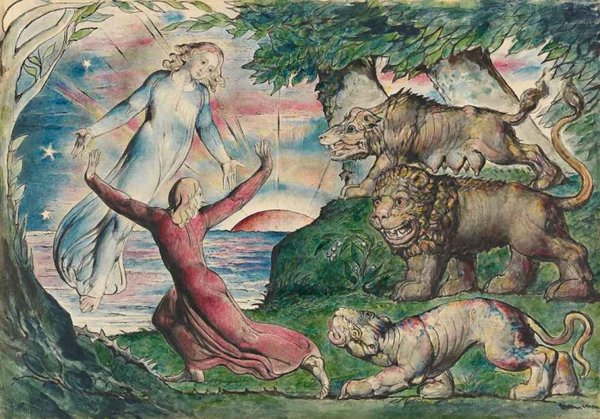:max_bytes(150000):strip_icc():format(webp)/GettyImages-639559527-57e8a2553df78c690fa2bd91.jpg) |
| (via, which gives parallel text) |
He starts with quoting (from memory) the opening lines:
Nel mezzo del cammin di nostra vitami ritrovai per una selva oscura,ché la diritta via era smarrita.and in the next 12 minutes has a little conversation with Dante. Good fun, though it sounds a bit aggressive at times. I'm currently reading "yet another Donna Leon", this one concerning theft of rare books from an old-style library - and bringing in many aspects of Italian and Venetian life and culture, sad failings and scandals - so coming across a bit of Dante was serendipitous - and tantalising.
Most of us have a passing acquaintance with Dante Alighieri (c1265-1321), if only through his infatuation with Beatrice, or perhaps because he was instrumental in establishing the literature of Italy. As Wikipedia points out:
his depictions of Hell, Purgatory, and Heaven provided inspiration for the larger body of Western art. He is cited as an influence on John Milton, Geoffrey Chaucer and Alfred Tennyson, among many others. In addition, the first use of the interlocking three-line rhyme scheme, or the terza rima, is attributed to him.Sansom says that TS Eliot said that the last cantos of Paradiso are as great as poetry ever gets, so it's a shame that most of us never get there because we get bogged down in the infernal torments, which are, let's face it, "sometimes boring."
Project Gutenberg makes the Divine Comedy available as a free e-book, and many versions, eg illustrated by Dore, can be found for a pittance online. William Blake did some illustrations; goodness, who didn't, over the years?
 |
| Hear the accompanying passage on the Tate website |
Canto I of the Inferno starts thus -
Midway upon the journey of our life I found myself within a forest dark, For the straightforward pathway had been lost. Ah me! how hard a thing it is to say What was this forest savage, rough, and stern, Which in the very thought renews the fear. So bitter is it, death is little more; But of the good to treat, which there I found, Speak will I of the other things I saw there.
Read it all here (or elsewhere) in English or Italian (here, for example); many translations are available, eg tthat by Longfellow in the 1870s is online, as is John Ciardi's (1954). If your Italian needs refreshing, parallel text or bilingual versions are available; if you know Dante's work well, you may want to go for some intertextual enlightenment.
The Divina Commedia has been the source of much academic research over the ages (eg Princeton Dante Project, 1999) and of digital enhancement in the past few decades (eg Intertextual Dante, 2013, or the mapping of places mentioned in the Commedia.
 |
| Places mentioned by Dante (via) |
No comments:
Post a Comment